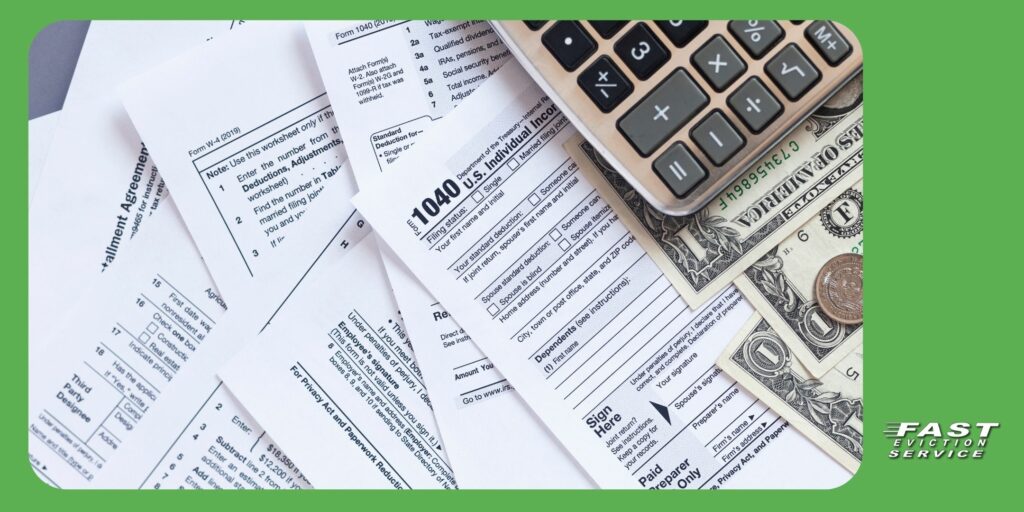Updated 7/26/24
Rental property owners have many ways to save money and reduce their taxes by understanding the U.S. tax code and knowing how to use deductions.
The first step is understanding there are two types of expenses and what qualifies as an expense that landlords can deduct from their taxes. The two types of expenses are current expenses which can be deducted in the year they are incurred, and capital expenses that are long term and must be depreciated.

Current Expenses
Current Expenses are generally one-off items that keep the property maintained in good working order and habitable, as well as other expenses that help operate your business. Current expenses can be 100% deducted from your taxes in the same year in which they were incurred.
To qualify, the current expense must be:
- Ordinary and Necessary Ordinary expenses are those which are common and generally accepted in that particular business or trade. Necessary expenses are those that are deemed appropriate, such as interest, taxes, advertising, maintenance, utilities and insurance.
- Current Current expenses must have more of a short term rather than a long term value. For example, fixing a broken dishwasher is a current expense. Replacing the broken dishwasher with a new on is a capital long term expense.
- Directly related to the rental business
- A reasonable amount
Capital Expenses
Any expense that increases the value of the property or extends its life over a period of time is considered a capital expense which must be depreciated in stages over multiple years. Capital expenses tend to be more expensive items that cost hundreds of dollars to replace.
Tax Deduction Categories
- Interest
If your property has a mortgage, interest payments will probably be your largest single tax deduction. Loans used to improve the rental property including HELOC loans are deductible, as well as credit card interest payments on items used for the rental business.
- Property Depreciation
The costs of large capital expenses cannot be fully deducted in the year they were incurred, but must be depreciated or spread out over several years of their useful life span. For example, much of the cost of buying rental property can be written off as a tax deduction over time. 27.5 years is the rate at which the IRS allows rental buildings to depreciate, which means you can deduct 1/27th of the cost of the property each year. Property depreciation is actually a required expense by the IRS.
- Taxes
Most landlords qualify for a new pass-through tax deduction established in 2018 by the Tax Cuts and Jobs Act. This is a special income tax deduction which, depending upon their income, landlords may be able to deduct up to 20% of their net rental income.
Another recent change in tax law in 2017 is that landlords do not have to pay FICA taxes that fund Social Security and Medicare. This gives landlords the benefits of being self-employed but not having to pay Social Security taxes.
- Repairs
The IRS considers repairs as coming under two different categories. Improvements to the property which increases its value, or returning things to their original condition. If it is an improvement, then it comes under a capital improvement and is depreciated. However, if it is a repair intended to maintain the current condition of the property it is a current expense and can be 100% deducted in the year in which the cost was incurred.
The line can sometimes get blurry between the two. Replacing a roof is a major capital expense that needs to be depreciated. But at what point do roof leaks in certain portions of the roof go from being a repair to a capital improvement?
Be sure to be clear in your own thinking should you ever be audited to have solid reasons to make a 100% deduction rather than a capital expense that needs to be depreciated.
- Maintenance Costs
Maintenance costs differ from repairs in that they aren’t fixing something that’s broken or needs to be replaced, but is simply maintained to keep it operating. They can include high ticket items homeowner association fees, to pest control, janitorial costs or smoke detector batteries.
- Insurance
You can deduct most insurance premiums you pay for almost any type of insurance. This includes fire, theft, and flood insurance for your rental property, as well as landlord liability insurance.
If you have employees like a property manager, you can also deduct the cost of their health and workers’ compensation insurance.
- Utilities
You can deduct the cost of utilities for rental properties that the landlord pays.
These usually include gas, electricity, water and sewer, trash removal and heating oil. But landlords need to understand that if they collect utilities from tenants, they need to enter it as income.
- Travel Expenses
Studies have found about half of landlords do not live close to their rental property. Travel expenses are tax deductible that are paid by the landlord to go to the property for repairs, deal with tenant complaints or go to a hardware store to purchase supplies used for the upkeep of the property.
Vehicle expenses can either be deducted if they are a business vehicle by depreciation, or as mileage or gas/maintenance use of personal property as a business expense.
However, a landlord cannot deduct the cost of travel to improve rental property with capital expenditures. These expenses must be depreciated over several years.
- Legal and Professional Fees
Expenses are deductible for professional services if it’s an attorney, accounting and tax preparation help, or structural engineering and consulting. These can also include legal fees such as drafting rental agreements or eviction services and court filing costs, as well as annual costs for LLCs. Tenant screening costs and background checks also qualify.
- Property Management Firm Fees
If you use a property management firm, these fees are 100% tax deductible in the year they are incurred as a business expense.
- Home Office
Home office deduction is a common deduction landlords take, although you have to be very careful how you use it because it’s one of the most commonly flagged deductions by the IRS that can trigger audits. To take advantage of this deduction, you need to set aside a percentage of your home for business related activities. That percentage of your housing bill can be deducted.
There are two basic requirements for your home to qualify as a deduction. That it is used regularly and exclusively for your business and that it is your principal place of business. Be prepared to back up any claim of a home office deduction by being able to prove that square footage was used exclusively for your business if the IRS wants photos, and the amount of time you spend there on business.
- Advertising
Advertising expenses to fill tenant vacancies are fully deductible in the year they are incurred.
- Commissions
Landlords often offer commissions as an incentive to current tenants to help fill vacancies. These can be either cash payments commonly in the $50 – 100 range, or deductions from rent. Either way, they can be claimed as business expenses.
- Start-up Expenses
For landlords just going into the property rental business, start-up expenses are any expenses that would be deductible as an operating expense in an established business when its incurred before the business starts.
However, unlike normal operating expenses for an ongoing business, start-up expenses cannot be automatically deducted in a single year because the costs are spread over several years of the business’s operation, and so usually need to be depreciated.
The maximum allowable deduction for start-up expenses is $5000 in the first year.
- Making Property Wheelchair or Elderly Accessible
By making improvements to your property to make it accessible to people with disabilities or the elderly such as wheelchair ramps, these expenses can be 100% deductible. But they must be depreciated as a capital expense because their benefit stretches over several years Because IRS regulations are constantly being updated and changed, it’s important to get the help of an accountant to make sure your knowledge of these deductions is current. IRS requirements can often be mind numbing reading and tax preparation software can be a big help deciphering and simplifying the requirements that are essential to understand correctly to be certain you are receiving all the landlord tax deductions and credits you are entitled to.



